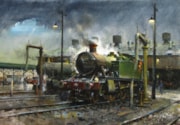back@using System.Web;

Terence Tenison Cuneo, CVO, OBE, RGI
(1907 - 1996)
Terence Cuneo was the establishment artist for much of the latter half of the 20th century. Painter of portraits, the Coronation of 1953, artist to industry, renowned for his works portraying mines, dams, industrial processes, but above all his railway scenes.
Cuneo was born in London, 1st November 1907, the son of Cyrus and Nell Cuneo, artists who had met whilst studying with James Abbott McNeill Whistler (1834-1903) in Paris. Terence Cuneo studied at the Chelsea Polytechnic from 1924 to 1927 before, like his father, working as an illustrator for magazines, books and periodicals. In 1936 Cuneo started working in oils, continuing with his illustration work. During the war he worked for the War Artists Advisory Committee providing illustrations of aircraft factories and wartime events. Following the war Cuneo was commissioned to produce a series of railway posters; locomotive, track, locomotive works and bridges, the latter involved being lashed to the Forth Bridge in a gale.
A significant point in his career was the commission to portray the Coronation in 1953, which brought his name before the public worldwide. He received more commissions from industry, which included the depiction of manufacturing, mineral extraction, road building, including the M1, and many portrait commissions; HM the Queen, and Field Marshal Montgomery. Cuneo painted over a wide range on his own account; big game in Africa, landscapes and his famous ‘mouse paintings’ a legacy of which being the inclusion of a small mouse in each of his paintings, his trademark. Further success was achieved in his regimental commissions, battle scenes and incidents as well as portraits but above all, it is Cuneo’s longstanding fascination with railways for which he is renowned.
His works can be found in museums in: London, Collection of HM the Queen and the Royal Institution.
Cuneo was born in London, 1st November 1907, the son of Cyrus and Nell Cuneo, artists who had met whilst studying with James Abbott McNeill Whistler (1834-1903) in Paris. Terence Cuneo studied at the Chelsea Polytechnic from 1924 to 1927 before, like his father, working as an illustrator for magazines, books and periodicals. In 1936 Cuneo started working in oils, continuing with his illustration work. During the war he worked for the War Artists Advisory Committee providing illustrations of aircraft factories and wartime events. Following the war Cuneo was commissioned to produce a series of railway posters; locomotive, track, locomotive works and bridges, the latter involved being lashed to the Forth Bridge in a gale.
A significant point in his career was the commission to portray the Coronation in 1953, which brought his name before the public worldwide. He received more commissions from industry, which included the depiction of manufacturing, mineral extraction, road building, including the M1, and many portrait commissions; HM the Queen, and Field Marshal Montgomery. Cuneo painted over a wide range on his own account; big game in Africa, landscapes and his famous ‘mouse paintings’ a legacy of which being the inclusion of a small mouse in each of his paintings, his trademark. Further success was achieved in his regimental commissions, battle scenes and incidents as well as portraits but above all, it is Cuneo’s longstanding fascination with railways for which he is renowned.
His works can be found in museums in: London, Collection of HM the Queen and the Royal Institution.

